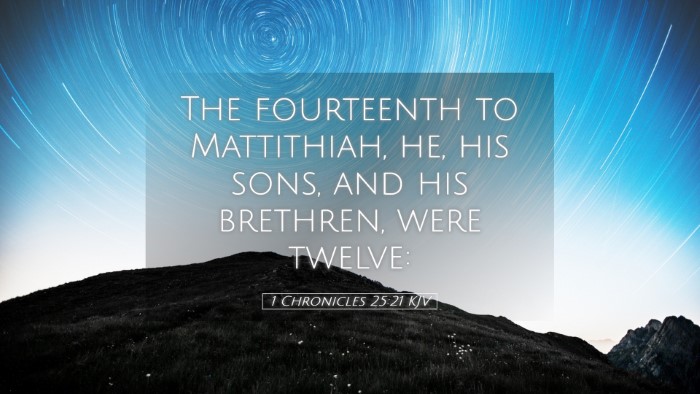Commentary on 1 Chronicles 25:21
The verse 1 Chronicles 25:21 states:
"The fourteenth to Mattithiah, he, his sons, and his brethren, were twelve."
This verse appears within a genealogical and organizational context, highlighting the division of responsibilities among the Levitical singers in the temple worship. The details provided serve to not only affirm the lineage and role of Mattithiah, but also to illustrate the larger structure of worship that was central to Israel's relationship with God.
Understanding the Context
The overarching context of 1 Chronicles 25 is the establishment of music as a pivotal component of worship during the reign of David. This chapter specifically mentions the families of Levites who were appointed to the ministry of song, dedicating their talents to the glorification of God.
The Role of the Levites
Levi's descendants played essential roles in the spiritual life of Israel. The duties distributed among the Levites extended beyond ordinary service; they were to lead the congregation in worship through music. As highlighted by Matthew Henry, the organization of the Levite musicians shows a "deliberate and careful planning" under David's reign.
Mattithiah's Significance
Matthew Henry writes that the mention of Mattithiah not only signifies his personal legacy as a leader of worship but also emphasizes the communal nature of worship, where "his sons and brethren" shared in this sacred responsibility. Each member of this family contributed to the musical ministry, indicating that such roles were not solely individual but rather a collective service to God.
Insights on Numbers and Organization
The number "twelve" has significant biblical symbolism. Albert Barnes explains that the number represents completeness and divine order. The division of the musicians into specified groups reflects God's design in the organization of His people and worship. The specific numbering of Levites indicates that God is a God of order, contrasting with chaotic worship practices prevalent in other cultures.
Theological Implications
The appointment of singers emphasizes that worship is multi-faceted, involving preparation, participation, and organization. Adam Clarke notes that such structured worship was crucial in ancient Israel, as it fostered a sense of community and collective identity among the people of God. It is not merely about the performance of music but embodies the very essence of worship—unifying people in glorifying God.
Lessons for Contemporary Worship
The dedication to maintain a structured environment for worship is a relevant lesson for today's churches. The order in 1 Chronicles 25 encourages modern congregations to prioritize the quality of their worship and carefully organize their worship teams. This can be seen as a call to recognize the giftedness of individuals in leading and enhancing the worship experience.
Concluding Thoughts
1 Chronicles 25:21 is more than a historical record of Levitical singers; it serves as an instructive passage, reminding both ministers and congregants about the importance of worship. Through the example of Mattithiah and his family, we are invited to appreciate the act of worship as a communal effort, grounded in divine order and purpose.
As we reflect on this verse, may we be inspired to devote ourselves to God’s service, using our gifts collectively to glorify Him in worship.


